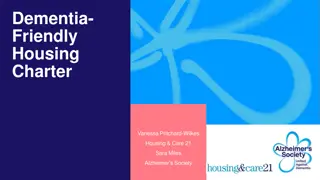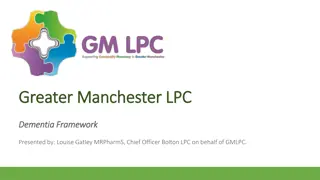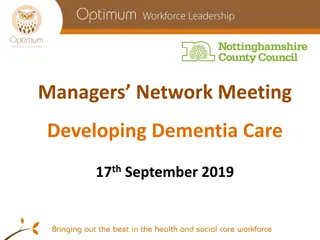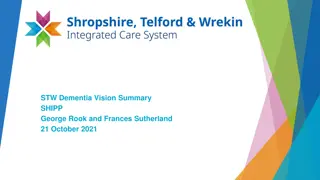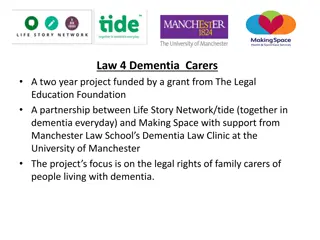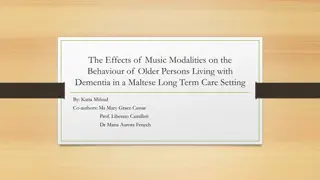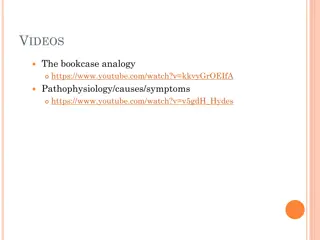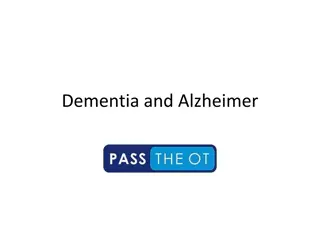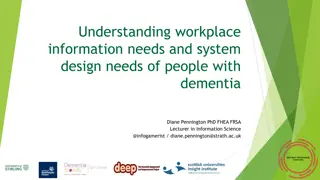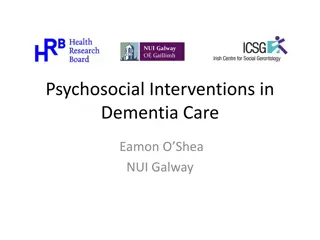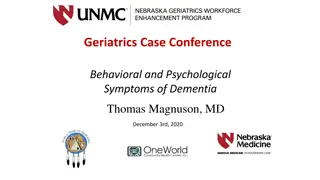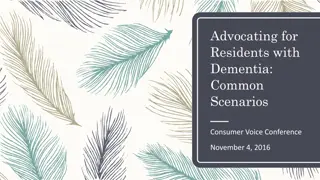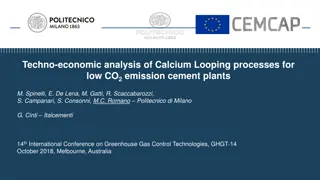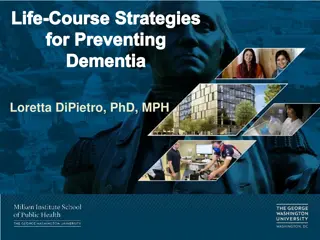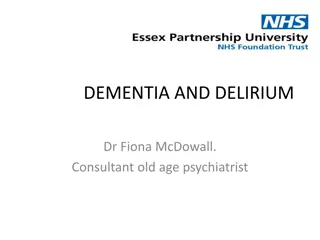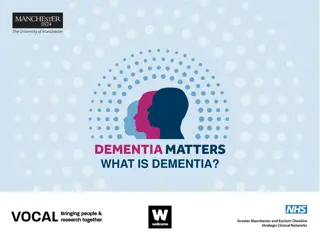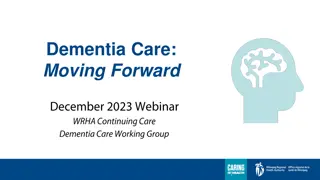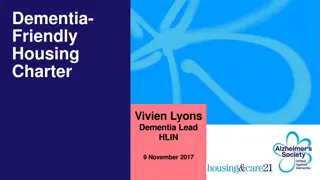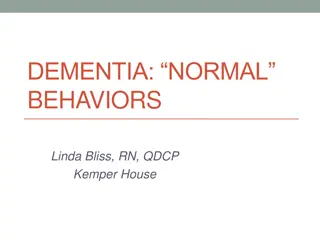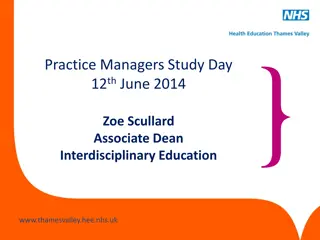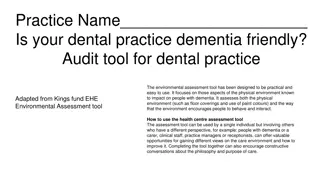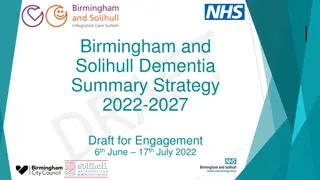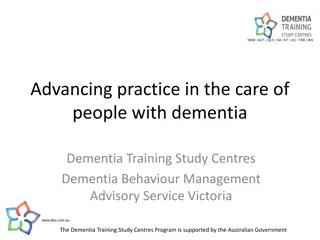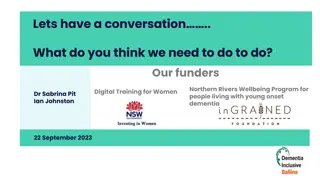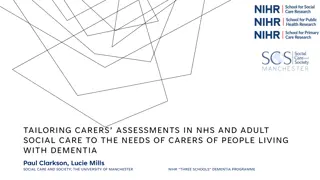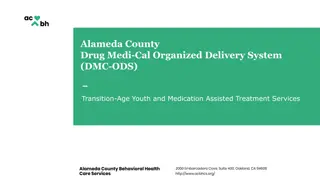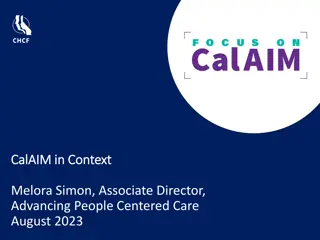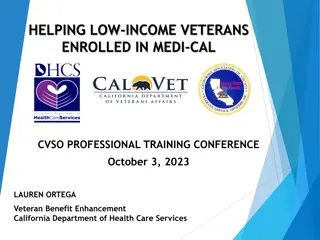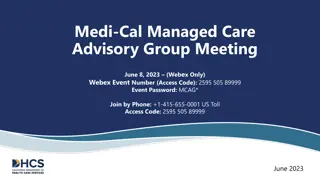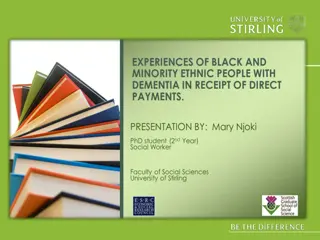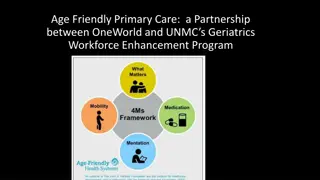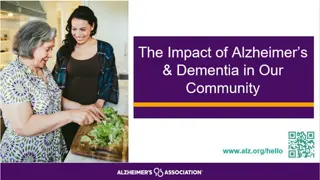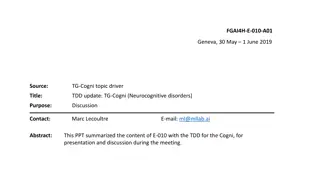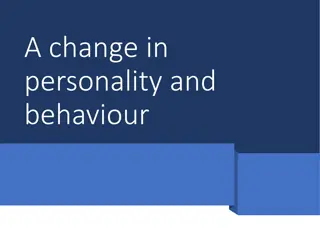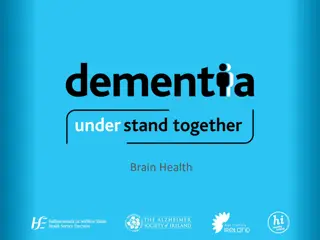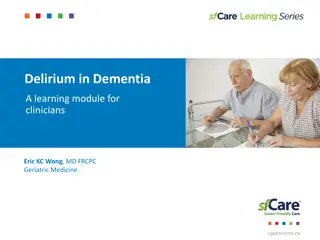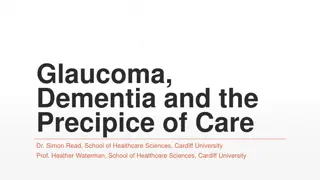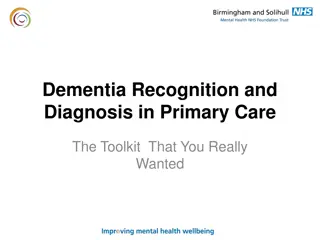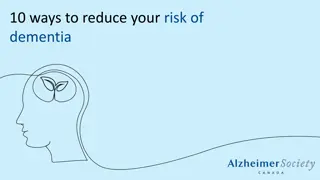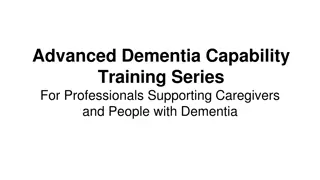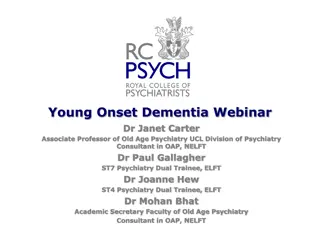Dementia Cal MediConnect Project Overview
The Dementia Cal MediConnect Project, led by Debra Cherry, PhD, aims to create dementia-capable systems of care by improving patient detection and support for caregivers. The project is funded by various organizations and involves key components such as advocacy, care manager training, and health plan support services. Participating plans must provide a range of Medicare and Medi-Cal services along with supplemental benefits. Policy levers and partnerships with organizations like the University of California, San Francisco, are key to achieving project goals.
Uploaded on Oct 02, 2024 | 0 Views
Download Presentation

Please find below an Image/Link to download the presentation.
The content on the website is provided AS IS for your information and personal use only. It may not be sold, licensed, or shared on other websites without obtaining consent from the author. Download presentation by click this link. If you encounter any issues during the download, it is possible that the publisher has removed the file from their server.
E N D
Presentation Transcript
The Dementia Cal MediConnect Project Debra Cherry, PhD
Funding This project was supported, in part by grant numbers 90DS2002-01-00 and 90DS2017-01-00, from the Administration on Aging, U.S. Administration for Community Living, Department of Health and Human Services, Washington, D.C. 20201 and the California Department of Aging. Additional funding was provided by: TheChange AGEnts Initiative Dementia Caregiving Network, funded by The John A. Hartford Foundation through a multi-year grant to The Gerontological Society of America The Harry and Jeanette Weinberg Foundation The Ralph M. Parsons Foundation The Allergan Foundation The Rosalinde and Arthur Gilbert Foundation
Partners University of California San Francisco Northern California & Northern Nevada Chapter
Cal MediConnect Health Plan Benefits Participating plans must provide: All Medicare and Medi-Cal services: primary and acute care, prescription drugs, & most behavioral health and LTSS. Supplemental benefits not otherwise available under Medi-Cal: dental care, vision care, and non-emergency medical transportation. Care management services. Plans have discretion to provide: Other home and community-based services like respite, non-medical transportation, Medic Alert bracelets, etc.
Policy Levers for DCMC Project 3 Way Contracts Dementia Care Specialists Guidance on Identifying a Caregiver Informational Bulletin on Dementia Health Risk Assessment Changes
Dementia Cal MediConnect Project Goal: Creating Dementia- Capable Systems of Care Better detection & documentation of patients with dementia Better identification, assessment, support and engagement of family/friend caregivers Better partnerships with community-based organizations
The Dementia Cal MediConnect Project: Key Components Advocacy with health plans, state and CMS - Making the case for focusing on dementia care Care manager training and support Health plan technical assistance Support services for patients and caregivers through the health plans and/or through referrals to local Alzheimer s organizations for: o Disease education o Caregiver support o Care planning o I & R o Respite
Indicators of a Dementia Capable System Better detection of patients with dementia Include cognitive impairment questions in the HRA and other assessments Adopt a validated screening tool Document cognitive assessment in the e-medical record Establish a follow-up protocol if the cognitive screen is positive
Indicators of a Dementia Capable System (2) 2. Better identification, assessment, support and engagement of family/friend caregivers Identify caregiver and document him/her/them in the eMR Assess the caregiver s needs Provide or arrange for disease education and support Engage the patient, as appropriate, and the caregiver in care planning Develop a care plan based on person- and family-centered needs
Indicators of a Dementia Capable System (3) 3. Better partnership with Community-Based Organizations Adoption of a proactive referral tool to connect families to LTSS like: Respite Meals on Wheels Support groups Caregiver education Care counseling Disease education
Care Manager Training Care manager training (8 hours) 10 health plans plus PPGs and contracted LTSS organizations Nearly 500 care managers Dementia Care Specialist trainings (12 hours) 9 health plans 109 specialists trained to date
Dementia Care Manager Training Content Fundamentals of Cognitive Impairment, Alzheimer s Disease and Related Dementias AD8 Screening Practical Dementia Care Management IDEA! Behavior Management Approach Caregiver Tip Sheets on Behaviors Best Practice Care Plans Caring for the Caregiver Resources/Support Services ALZ Direct Connect www.alzgla.org/professionals
Plain Language Caregiver Tip Sheets Anger and Fighting Bathing Getting Lost Medications Hallucinations Paranoia Sundowning And more
Resources Available Resources available for download at: www.alzgla.org/professionals
Tools available Sample HRA Questions Benjamin Rose Caregiver Stress and Strain Scale and others Training Curricula for Care Managers Care Needs Assessment Tool ALZ Direct Connect Form (for adaptation) IDEA! Strategy for Managing Challenging Behaviors Dementia Care Management Toolkit AD8 Dementia Screening Tool and others Best Practice Care Plans Caregiver Identification Tool Plain Language Caregiver Tip Sheets Download at: www.alzgla.org/professionals
Evaluation Design Care Manager training outcomes Knowledge of ADRD Practice change, outcomes Systems change Pre-, post- and 6 months post surveys Systems Change Tracking Tracking indicators of dementia capable systems of care. Staff report and key informant validation
Health Plan Systems Change Results (n=10) Screening and Diagnosis All have at least one question in HRA regarding cognitive issues 6 have adopted a validated screening tool and integrated results into their EHR 5 have protocol to refer members for a diagnostic evaluation if screen is positive Caregiver Identification, Assessment, and Involvement 9 report documentation of caregivers 4 plans report engaging caregivers in care planning and ICTs 2 adopted validated measure of caregiver stress and strain and integrated into EHR 6 offered respite as a Care Plan Option, 1 offered other non-covered LTSS services 6 plans offer or arrange for caregiver education Referrals to HCBS 4 plans have formally adopted ALZ Direct Connect All plans make referrals to the Alzheimer s organizations
Member Cognition Screening Health Risk Assessment (HRA) identifies members memory concerns / recent changes in cognition Molina added a validated tool into the clinical software to screen members for dementia AD 8 Creation of PCP Notification of AD 8 score
Caregiver Screenings Health Risk Assessment (HRA) and other methods identify caregivers of those with dementia AMA was added to the clinical system as a method to assess the stress levels of family caregivers Case Managers assist to link caregivers to appropriate resources based on identified needs
Dementia Cal MediConnect Project Team Project Co-Directors Lora Connolly, MSG Director California Department of Aging Debra Cherry, PhD Executive Vice President Alzheimer s Los Angeles Project Manager Jennifer Schlesinger, MPH, CHES Director, Professional Training and Healthcare Services Alzheimer s Los Angeles Project Evaluator Brooke Hollister, PhD University of California, SF Institute for Health and Aging Alzheimer s Los Angeles Barbra McLendon, MSW Kelly Honda Sergio Calderon Terry Garay Alzheimer s Association Elizabeth Edgerly, PhD Ruth Gay, MS, Team Lead Pauline Martinez, MA Alexandra Morris, MA Angie Pratt, MAS Susan DeMarois Alzheimer s San Diego Jessica Empe o, MSW Amy Abrams, MSW, MPH



